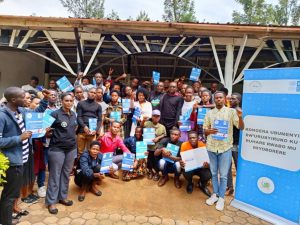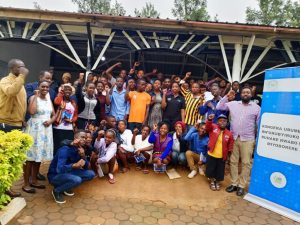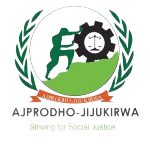
Participation and engagement of non-state actors
PUBLIC POLICY INFORMATION MONITORING AND ADVOCACY (PPIMA PROJECT):
AJPRODHO-JIJUKIRWA in partnership with Norwegian people’s Aid (NPA), is implementing Public Policy Information Monitoring and Advocacy (PPIMA) project in Nyagatare and Ngoma districts with overarching purpose of promoting an active interest and engagement among Rwandan citizens and Civil Society Organizations in national and local level processes of policy formulation and implementation, to ensure that policies work to deliver improved services, especially for poor Rwandans.
The Public Policy Information, Monitoring and Advocacy (PPIMA) project is also a civil society supported project aimed at strengthening the engagement of Rwandan civil society organizations (CSOs) and citizens in public policy affairs. The Public Policy Information, Monitoring and Advocacy project brings local partners together in a unique collaboration to make citizens aware of their basic rights and to give them the skills they need to be able to engage in positive action to raise their points of view and interests with decision makers and service providers.
PPIMA project is in line with and supports:
-
National policy instruments such us: Vision 2020, and government program to implement it like Economic Development and Poverty Reduction (EDPRS), Sector Strategic Plans and District Development Strategies and National Strategy for Transformation (NST) which will support to implement the vision 2050.
-
The Rwanda Decentralization Strategic Framework, and the Joint Governance Assessment Framework. This intended that, through the PPIMA Project, Rwandan citizens and Civil Society will become better informed about public policy and plans and more aware of their rights and entitlements in relation to public services.
Generally, AJPRODHO has been implementing PPIMA Project in partnership with NPA since 2010.
In 2010 up-to 2013 PPIMA project was in Gatsibo district , 2016 to 2022, PPIMA was being implemented in Nyagatare district, and in 2021 upto date the project is currently in Ngoma district. PPIMA Project has a scale up plan in 2024 to KIREHE, KAYONZA, GATSIBO and NYAGATARE Districts with the aim of Greening PPIMA under Environmental Justice as the area of intervention.
Additionally, Beneficiaries of PPIMA Project are named as Governance Focal Persons ( GFPs). A gendered disaggregated data of 192 GFPs selected and operating from all 14 sectors and 64 cells of Ngoma District are 71 females and 192 males while in Nyagatare District are 324 GFPs 116 females and 208 males operating in 14 sectors and 108 cells of the district.
Governance Focal Persons have a vital role of facilitating the various stages of the scorecard meeting process, including the Interface Meeting with Service Providers, ensuring maximum participation and inclusion.
Key accomplishments under the Democracy and Governance thematic area , the project of PPIMA
-
Conducting community score card on different services in Gatsibo Nyagatare and Ngoma Districts. As a result, the community score card approach has been mainstreamed in the District planning processes. Gatsibo District has significantly improved in terms of Imihigo performance and service delivery national level rankings
-
Establishment of Community and national level based advocacy frameworks. The Monitoring and Advocacy groups (MAG) was introduced in Nyagatare District as a platform of engagement between service seekers and service providers. At national level, the Forum for Dialogue on public policy (FDP) was established to facilitate coordinated national level advocacy interventions on governance issues by the CSOs. Consequently, the FDP has engaged on a number of advocacy issues including; property law, income tax law etc.
-
Spaces for unity, and reconciliation created. In total, 1,144 peace clubs were created to promote dialogue on unity and reconciliation.
-
Monitoring of elections; including presidential, parliamentary elections and local government elections.

This photo illustrates the First community meeting that brings together all villages within a Cell in the Citizens’ assembly to raise up their issues found in each of the three pillars of the National Strategy for Transformation “NST” for advocacy.
 At the Citizen Assembly community meeting stage; Governance Focal Persons lead and encourage community in different groups; Women, Youth, People with Disabilities, Historically Marginalized people to raise their particular issues for advocacy.
At the Citizen Assembly community meeting stage; Governance Focal Persons lead and encourage community in different groups; Women, Youth, People with Disabilities, Historically Marginalized people to raise their particular issues for advocacy.- Explanation on the use of community Score card is made , and
- Feedback on the previous commitment is shared to the citizens.
This shows the Stage 2 of Community Scorecard process named as Interface Meeting. It is a crucial stage of the Community Scorecard process as it provides a space for constructive dialogue between Service Providers and Service Users (the Community).

Through PPIMA Project, there is an approach named “SOCCER4CHANGE” this approach enhances and increases citizen participation especially Youth to participate meaningfully in the Government programs and plans and contribute to District planning and IMIHIGO. This is done through recreational activities like intersectoral games as demonstrated above.

Here is the AJPRODHO Programs Manager, Mr. John Scarius officiating the play of girls and boys in kazo sector located in Ngoma District.

This photo demonstrates citizen participation in resolving their issues especially on the case of building KIRIKO – NYAKAGEZI Bridge in GAFUNZO cell. Capacity building also given to Governance Focal persons in Ngoma District yielded results of increasing participation in resolving issues raised through the use of Community Score Card.
Project of Rwanda civil society
Project of Rwanda civil society, Enhancing the participation and engagement of non-state actors for more accountable and responsive governance in Rwanda brief on description of planned activities;
- strengthening capacities of non-state actors (CSOs) on citizen participation and evidence-based advocacy to drive youth, women and PwDs’ meaningful participation and engagement at the community level
- Enhancing engagement of civil society with the government through public consultations and policy dialogues
The achievements
Providing training sessions to the Youth on effective citizen participation had a direct impact by empowering them with knowledge about civic processes, encouraging critical thinking, and fostering a sense of responsibility. this resulted into increased civic engagement, informed decision making, and a more active and participatory community (like participating in Umuganda and umugoroba w’Umuryango)


Two days training sessions about: Strengthening capacities of non-state actors (CSOs) on citizen participation and evidence-based advocacy to drive youth, women and PwDs’ meaningful participation and engagement at the community level in Gatsibo District.

